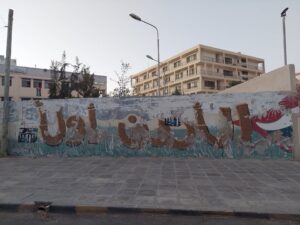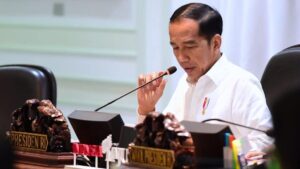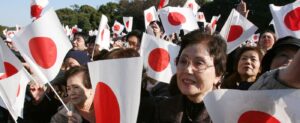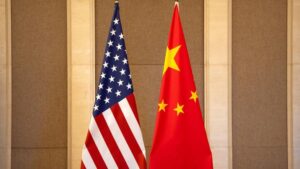Dismissal of the Murder of Jamal Khashoggi: Is This the Windup of Justice?

The protestors hold a poster of Jamal Khashoggi in 2020. Foto: A. Morissard/IP3press
The murder case of Jamal Khashoggi, a Saudi journalist, has been said to revolve around his constant criticisms towards the Saudi Government, particularly the Saudi Crown Prince, Mohammad bin Salman (MBS). MBS is spooked by his criticism on repressions by the Saudi government towards those standing in the way of the reforms taking place within the borders of his country. Nevertheless, his opinions were not only significant for the freedom in his country but for the Arab World at large.
In his column in the Washington Post published in 2017, he especially highlighted the situation of rampant arrests of intellectuals, journalists, and religious leaders voicing their opinions within the borders of his country, which was contradictive to the promise made by MBS of a more open and tolerant Saudi Arabia. He also criticized the failure of his country in contributing to the free elections in Yemen when Abedrabbo Mansour Hadi was Yemeni president and the hardliner stance of his country towards the Houthi Yemen, which put the lives of Yemeni innocent civilians on the line as the war in Yemen.
In 2018, Khashoggi went missing as he went to the Saudi consulate in Istanbul, Turkey to obtain the necessary documents for his marriage with his fiancée. After a lengthy process of investigation and search of his body, on November 17 2018 the CIA made a conclusion that MBS was involved in the assassination of Khashoggi. Further, in 2019, Agnés Callamard, the then-UN Special Rapporteur on extrajudicial killings led the investigatory process in Istanbul and called for further investigations of MBS through a report as she concluded that it was an extrajudicial killing and that the Saudi Government had to be held accountable. A year after, the CIA released a report that confirmed the authorization of the Crown Prince for the arrest of Khashoggi in Istanbul.
Unfortunately, the legal proceedings of the case have not resulted in the justice that the journalist deserves. In 2019, a trial was held in Saudi Arabia; 11 people were tried, 5 were sentenced to death. Yet Saud al-Qahtani, a prominent advisor to the Crown Prince who has been alleged to have been involved in conspiring to murder Khashoggi, was freed of any allegations and accusations. Further, in 2020, together with a human rights group called Democracy for the Arab World Now (DAWN), Hatice Cengiz, Khashoggi’s fiancée, filed a lawsuit against MBS in a US Court in Columbia.
One year later, a trial was held in Turkey yet the Turkish Court refused to include report of the case from the US, the Crown Prince was not included during the hearing and therefore the case was nearing a deadlock. Eventually on April 7, 2022, the Turkish Court handed the case over to Saudi Arabia. In the same year, MBS was appointed the Prime Minister of Saudi Arabia by King Salman. More recently, on December 6, 2022, the case of Khashoggi’s murder against MBS was dismissed by the US Court, as the Judge said that MBS, as a state leader, was immune from prosecution.
This article seeks to provide the relevant explanations and comments surrounding the perspective of international law as well as the behavior of states on this particular murder case of Jamal Khashoggi. Further, through such explanations and comments, this article would point out a glimpse on whether or not justice for Khashoggi may still be possible.
A General Explanation in the Perspective of International Law
First and foremost, according to the Office of the High Commissioner for Human Rights (OHCHR), the murder case of Jamal Khashoggi is undoubtedly an extrajudicial killing and Saudi Arabia, as a state, is deemed responsible for the killing. The international human rights law has indeed prohibited arbitrary killing through the International Convention on Civil and Political Rights (ICCPR), which could be found in the first paragraph of article 6 of the convention. Currently there is no international law instrument that provides the detailed definition of extrajudicial killing. Nevertheless, in a general sense, extrajudicial killing could be understood as a killing that occurs without being in accordance with the procedures of law. Furthermore, the Torture Victim Protection Act (TVPA), a statute adopted by the US in 1991 that would allow the American as well as foreign citizens to file a lawsuit for cases of torture and extrajudicial killings, defines extrajudicial killing as follows:
‘…a deliberated killing not authorized by a previous judgment pronounced by a regularly constituted court affording all the judicial guarantees which are recognized as indispensable by civilized peoples. Such term, however, does not include any such killing that, under international law, is lawfully carried out under the authority of a foreign nation.’
Torture Victim Protection Act od 1991 (1992)
By looking at these definitions of extrajudicial killing, indeed it is what the murder case of the journalist has been about; the murder was not a lawful decision of any court as it was carried out covertly and maliciously. Thus, what took place violated the prohibition to arbitrarily deprive anyone of their lives in the international law.
In addition, the OHCHR report also mentions that the case may constitute torture. According to the Convention against Torture and Other Cruel, Inhuman or Degrading Treatment or Punishment (CAT), torture is an act that involves the act of causing severe pain or suffering, physically or mentally by a public official or anyone having the official capacity to act, with the intention to obtain information or confession, to punish the third person for an act has been committed or an act suspected to have been committed or to coerce the third person based on any discriminative reasoning. Based on the transcript of the audio recorded while the murder was happening, Khashoggi was suffocated. In fact, it has been said that he was mutilated. Not to mention the fact that his body is yet to be found until today and therefore, the OHCHR report also calls the case a forced disappearance.
Aside from human rights, the murder of the journalist within the territory of Turkey also brought concerns on state relations; the case signifies the violation of the Vienna Convention on Consular Relations (VCCR). The OHCHR report states that the acts of killing and hiding in the murder case of Khashoggi disrespected the Turkish domestic law and definitely violated the right of Turkey, as a state, in the VCCR. Moreover, the incident violated the vital principles in the conduct of international relations.
The next thing to be assessed in the international law perspective is the decision to drop the murder case of Khashoggi by the US Court itself. The questions that are worth asking are ‘what is the purpose of immunity from jurisdiction for heads of states?’, ‘how far is the scope of the entitlement of MBS to immunity from jurisdiction?’.
The US Court Judge mentioned about the Crown Prince being entitled to sovereign immunity. Generally sovereign immunity means that a government would not be able to be sued if it is not under its consent. Nevertheless, there is a specific kind of immunity granted to government officials such as, Heads of Governments or diplomats, called ratione personae, where the immunity is given due to the official status of a government official. This sort of immunity is indeed recognized in the United Nations Convention on Jurisdictional Immunities of States and Their Property 2004 in article 3 paragraph 2. The basic purpose of this sort of immunity is to ensure that there would be no hurdles in the conducts of international relations and that communications among states through their representatives would be effective. Ratione personae immunity only applies as long as the person granted the immunity is still attached to the official status of his or her position in the government. In addition, it has been argued that arresting and prosecuting governmental officials, who are granted this immunity, would violate the immunity status yet it would be possible to call on them to voluntarily provide information or testimony.
However, the appointment of the Saudi Crown Prince as Prime Minister has clearly been quite absurd as the status of Prime Minister would normally be held by the King. It has been argued that this move taken by King Salman was intended to protect MBS from the lawsuit filed against him by Hatice Cengiz in a US Court.
International Responses to the Murder Case of the Journalist
When the murder case of the journalist first surfaced, the US under Trump’s Administration sought to revoke visas of the Saudi officials alleged to be involved in the incident and further said would further explore it, yet later the US became ignorant towards the incident, which could be reflected through the attitude of President Trump, that seemed to ‘shrug off’ the allegations towards the Crown Prince as he rudimentarily said that the CIA report was inconclusive. Further, an article published by the TIME Magazine describes that President Biden’s Administration considers it too costly to ruin its ties with the Kingdom due to its national interests. Indeed, it is clearly written on the official website of the US Government concerning its relations with Riyadh; Saudi Arabia has the second largest oil reserves in the world and is the third largest supplier of imported oil of the US, it is also a customer of the US with the largest foreign military sales (FMS) of more than $100 billion. In addition, the US is said to consider Riyadh as an important partner in tackling the Iranian expansionist agenda in the Middle East.
When the murder of the journalist just freshly occurred, President Erdogan was quite sharp in speaking up about the incident by saying that it was ordered by the highest levels of the Saudi government. Turkey decided to ‘ease’ its criticism towards MBS concerning the murder of the journalist as it sought to repair ties with the Kingdom due to the economic struggles hitting the country, although it has usually been a rival to Saudi Arabia in terms of leadership in the Muslim world.
Indonesia merely expressed its concerns on the case of Khashoggi and called for a transparent investigation in the year when the murder occurred. Afterwards, its voice concerning the issue was heard no more. Indonesia is indeed a country where Muslims are in the majority of the population and the country contributes the largest numbers of pilgrims annually to the Kingdom, which increases the significance of the relations between the two. In addition, the country is a Member State of ASEAN and as a regional intergovernmental organization, ASEAN holds dear the principle of non-interference. In the Treaty of Amity and Cooperation, it is written in the Preamble that the parties to the treaty, especially the Member States of ASEAN, are ‘anxious to promote regional peace and stability’, that differences in perspectives should be settled without involving attitudes that may harm cooperation and further in article 2 of the treaty respect for state sovereignty, non-interference, and the right of every state to be free from subversion and coercion are emphasized. It is common for an ASEAN country such as Indonesia to refrain from calling out other countries when it comes to human rights issues.
France and Germany together with other Member States of the European Union sought to respond to the murder case of Khashoggi as soon as it surfaced; Germany decided to immediately cut off its arms supplies to the Kingdom and France emphasized that together with its allies it would take the necessary measures to hold the perpetrators of the murder accountable. Indeed, France and Germany eventually cooperated on imposing travel sanctions on 18 Saudi Officials, preventing them from travelling within the Schengen Zone. Nevertheless, according to a Turkish news agency, details on whether or not MBS was among those sanctioned was not given. Further, in 2022, France and Germany decided to repair ties with Saudi Arabia. French President, Emmanuel Macron held a dinner with the Crown Prince and mentioned that France sought to deepen its relations with the Kingdom in addressing global challenges. Moreover, German Chancellor, Olaf Scholz met the Saudi Crown Prince with the intention to discuss the matter of energy partnership and when asked if the murder case of Jamal Khashoggi was brought to the table, the Chancellor responded with a ‘you can assume that nothing was left unsaid’.
Human Rights vs National Interests
While international law indeed confirms the immunity warranted to the Crown Prince, many sovereign states, especially the US and Turkey, may have indeed been reluctant to take significant actions to bring him to justice. In other words, from the patterns of the international responses towards the murder case of Jamal Khashoggi, it seems that the reason that MBS is not being prosecuted has not been merely due to the international law concerning sovereign immunity but also because states have their own national interests towards the Kingdom.
The vitality of human rights, as mentioned in the Preamble of the CAT, are undeniable in order to achieve world peace and justice. However, when it comes to making the efforts to realize and protect human rights, it often conflicts with national interests. Piet Hen van Kempen argues that applying high standard human rights protection, within the external affairs of states, where states interfere in the human rights protection of one another, may harm the peace in the relations among states. He further mentioned about the potential opportunity for states to pursue their ‘self-centred’ interests by taking the advantage of coercive means done in the name of human rights. According to a realist perspective, states are always involved in the struggle for power due to the need for survival. Thus, he may be right in the sense of states not acting in good faith or if it is not necessarily about power, states may simply attempt to protect the livelihoods of their citizens through the conducts of international relations. Indeed, according to the International Bill of Human Rights, states are responsible to protect the well-being of their peoples economically, politically, culturally and socially.
Nevertheless, the argument that says that impunity, where perpetrators of human rights violations are let free and even take part in the government, can inflict distrust towards the justice system and continual psychological threat to the future of the survivors as well as degradation and humiliation. There would never be true respect for human rights as long as the climate of impunity is there.
Conclusion
The international law has indeed guaranteed immunity for government officials and that such immunity would only last as long as the official holds his or her status. In this sense, to prosecute a government elite accused of human rights violations may still be possible. Nevertheless, in the murder case of Jamal Khashoggi, nobody would know for how long the Saudi Crown Prince would hold the title of Prime Minister, not to mention the fact that he is heir to the Saudi throne and would be the future King of Saudi Arabia. The chance for justice for the journalist may therefore be quite small yet it does not mean that such possibility has been completely extinguished.
The main barrier of investigating and eventually prosecuting MBS is not the international law that guarantees him immunity but the lack of political will of the international community. According to the international law harmonious relations among states and human rights are required for world peace. While currently respecting the immunity granted to the Crown Prince is necessary to maintain peaceful relations with Saudi Arabia, the justice that the journalist deserves should not be overlooked. Unfortunately, concerns on the murder case of Khashoggi is eroding among the public. Therefore, human rights groups should continue voicing huge concerns on the injustice towards Khashoggi in order to raise strong awareness among the societies and put pressures on governments.
Maria Frederika is a student at President University. She can be found on Instagram with username @mariafrdrk





